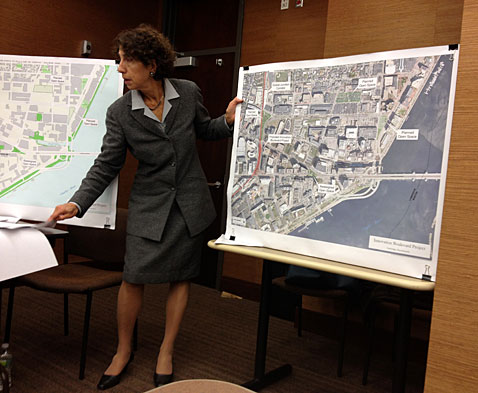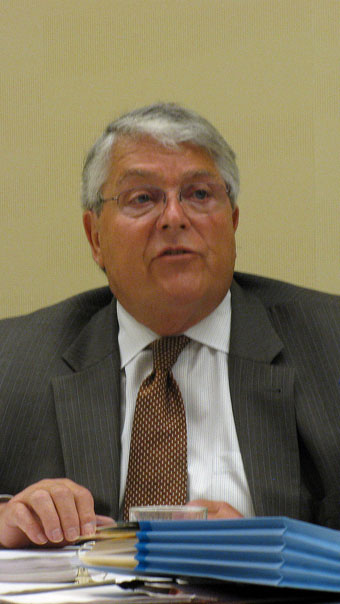Applause for openness launches CRA’s era without its resigned executive director

Susan Glazer, director of economic developer for Cambridge and its deputy director of community development, has stepped in as interim executive director for the Cambridge Redevelopment Authority. (Photo: Marc Levy)
Residents applauded the Cambridge Redevelopment Authority on Wednesday for its transparency in quickly posting the minutes of private meetings resulting in the resignation of its executive director Sept. 27.
“You have indeed set the standard for doing it right, and I want to commend you,” East Cambridge’s Heather Hoffman said.
“It’s the way it should be,” agreed Tom Stohlman, a recent City Council candidate.
The minutes of four closed-door meetings starting in June were posted online Monday, less than three weeks after the resignation. As reported by The Cambridge Chronicle, during the 32 months there was no active board at the agency overseeing development in Kendall Square, they showed executive director Joseph Tulimieri:
- gave himself raises that took his salary from $198,114 set in an April 1, 1999, contract to $204,100 as of July 1, 2009, then to $215,000 as of Jan. 1, 2010;
- awarded himself $431,745 for accrued sick days, vacation time and other compensation when he resigned from his full-time position effective Dec. 31, 2010;
- arranged his own part-time pay of $113 per hour, up to $78,617 a year, while taking home retirement benefits of about $141,863 annually.

Joseph Tulimieri was with the authority for more than three decades, ending with his resignation Sept. 27.
The authority’s accountant, Moura Ryan, resigned Monday, and an aide to Tulimieri, Tracy Mercer, resigned the same day as him, Sept. 27. Since the resignations, meetings have moved out of the Boston Marriott Cambridge, which Born said was an expensive place to hold them, to other sites starting with the Sixth Street police station. With a formal vote Wednesday by the board, Tulimieri’s role is being filled on an interim basis by Susan Glazer, who is also director of economic developer for the city and its deputy director of community development, and Kathy Spiegelman, a consultant on transition planning for the board, is preparing to interviewing candidates.
She had the task before the resignations, but she said Wednesday that “There’s a little bit more urgency about thinking about how long the board can prevail on Susan Glazer to actually fulfill all their needs. The idea of developing a mission and goals that allow the board to start seeking people for permanent staff [has become] more pressing. We thought we’d have more time.”
Closed-door meetings
The first two months of meetings were benign, according to the minutes. But the Sept. 19 meeting showed a close examination of Tulimieri’s compensation, and those from Sept. 27 show the result: a note that although Tulimieri was an at-will employee who could be fired “for any reason or no reason … It nevertheless appears that if cause were required, the CRA would have grounds to terminate his employment.”
Tulimieri, who had been at the authority for more than three decades, told the board he assumed his actions would have been approved retroactively by the board, but said he would resign if asked. Member Chris Bator asked, and Tulimieri complied, the minutes show.
Kathleen Born, chairwoman of the authority’s board, sent out an explanatory press release the day after saying that “in response to a report prepared by the authority’s outside counsel, the authority has become concerned that salary increases and benefit enhancements received by its executive director were not properly authorized.”
Born and Jeffrey Mullan, outside counsel for the authority from the law firm Foley Hoag, confirmed that the report mentioned was one Mullan wrote with two other lawyers from Foley Hoag about the 32-month “quiet period” when Tulimieri was running the agency without board oversight. The report refers to the authority’s bylaws as saying “the compensation of the executive director shall be determined by the authority,” and Born and Mullan confirmed Wednesday that it was this that provided a basis for questioning Tulimieri on his financial decisions. (While the minutes have Mullan saying the three lawyers’ report had revealed evidence of unauthorized increases, in fact it was only research for the report that revealed it; the information didn’t make it in.)
Independent counsel
“The authority is beginning the process of hiring independent counsel and a forensic audit firm to examine these concerns,” Born wrote in September, and a Legal Subcommittee — made up of board members and attorneys Bator and Margaret Drury — has interviewed firms for the role.
With Bator’s report Wednesday that they have interviewed several firms and “are moving reasonably expeditiously and hope to recommend to the board to hire … and get started in the quite near future,” the board voted unanimously to let Bator and Drury negotiate a contract and bring a potential hire forward for approval.
While probing financial decisions by “prior employees” is the initial concern, Bator said the independent counsel could “also give us advice with regard to whether there are other issues to which counsel believes we ought to act or need to act or to pay attention to. And as part of that, give us advice with regard to the need for addition and further auditing. ”
When the Foley Hoag report was accepted by the board Sept. 19, it was called a “starting point” for discussion of the various issues it looked at that would be taken up over the course of several meetings. There was no discussion of its contents Wednesday.
Residents seek more
It was clear from the public comment period that residents felt there should be discussion of the Foley Hoag report, much for the independent counsel to examine or both. While seven members of the public stood and congratulated the board for its standard-setting transparency in releasing the minutes of its closed-door meetings, there were also mild criticisms, such as Stohlman and others noting that from “your incredibly good, complete minutes” it was clear the private meetings were used to talk about things improperly identified or not listed. “I think your intent’s very good; I’m looking for perfection,” Stohlman said.
There were also lengthy notes from the public about other items they felt needed examination, including Steve Kaiser asking for changes in bylaws about board membership; answers about the roles of the agency’s auditor and legal counsel, developer Boston Properties and the city Law Department during the quiet period; and a look at development decisions made solely by Tulimieri without board oversight. Hoffman added her wishes for an exploration of the approval process for corporate and retail signs in Kendall Square, where city law says its zoning doesn’t apply “during the life of the Kendall Square Urban Renewal Plan” — but might have applied again when the plan failed to be renewed because there weren’t enough board members.
“You have no business talking about signs except to make recommendations to the city,” Hoffman said, although the Foley Hoag report said otherwise.
In the absence of action from Foley Hoag or an independent counsel, Kaiser and Hoffman have been examining board membership with dismaying results. The time with two or fewer members — meaning there was no quorum allowing business to be done — could have extended for a period of a decade or more, according to their research.
“This could be seen as ‘It’s all taken care of, this was bad stuff and now someone has resigned and let’s move forward’ or this can be seen as an opportunity,” resident James Williamson said. “And I would like to suggest that now that we have this resignation and a sense that there really was something wrong here, I would ask you to see this as an opportunity to take a stronger, closer look at some of the decisions put in place … There’s a real question about the decisions made during that period.”
This post was updated Oct. 18, 2012, to correct that at this point Spiegelman is only researching qualifications for an executive director.

